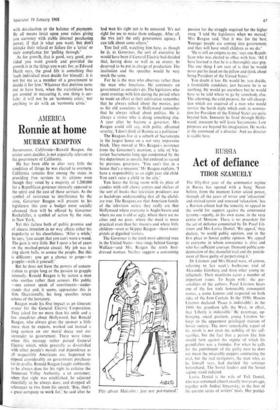Ronnie at home
AMERICA MURRAY KEMPTON
Sacramento, California—Ronald Reagan, the visitor soon decides, is not especially relevant to the government of California.
He has been able to alter very little the condition of things he was elected to overturn. California remains first among the states in providing free services to its citizens even though they voted by a majority of 1,200,000 for a Republican governor intensely opposed to the spirit and the cost of those services. As the symbol of resistance to interference by the state, Governor Reagan will present to his legislature this year a budget more socially advanced than will be offered by Governor Rockefeller, a symbol of action by the state, in New York.
Yet this failure both of public promise and of sincere intention in no way affects either his popularity or his cheerfulness. 'After a while,' he says, 'you accept that you can't wave a wand. The gain is very little. But I spent a lot of years on the mashed-potato circuit. My job was to ring alarm bells, to arouse the people. But this is different: you get a chance to grope—to grapple—with it yourself.'
But he does not have the powers of concen- tration to grope long or the passion to grapple intensely. Ronald Reagan is by nature a man who soothes rather than arouses. His public —one cannot speak of constituents=under- stands that and, it seems, appreciates this in him. Occasionally, his long speeches retain echoes of the hortatory.
Reagan made his first impact as an itinerant orator for the General Electric Corporation. They asked for no more than his smile and a few anecdotes about Hollywood, but Ronald Reagan, who always gives the sponsor a little more than he expects, worked out instead a long sermon on our moral decay and our surrender to government. There were times when this message rather pained General Electric which, while generally as dissatisfied with' other people's morals and dependence as all respectable Americans are, happened to depend considerably on government purchases for its profits. Ronald Reagan fought stubbornly as he always does for his right to criticise the Tennessee Valley Authority, a GE customer; when that right was established, he adjusted cheerfully as he always does, and dropped all references to TVA from his speech. 'Boy, that's a great company to work for,' he said after he had won his right not to be censored. 'It's not right for me to make them unhappy. After all, the TVA isn't the only government agency. I can talk about some others.'
You feel still, watching him here, as though he is, as Governor, the sort of executive he would have been if General Electric had decided that, having done so well as an orator, he deserved to be put in charge of production. The institution and the speeches would be very much the same.
For he is the man who observes rather than the man who functions. He comments on government as outsiders do. The legislators who spent evenings with him during the period when he made an effort at their cultivation remember that he always talked about the movies, just as his old associates in Hollywood remember that he always talked about politics. He is always a visitor who is doing something else. A year after he became a governor, Mrs Reagan could still say, with polite, affronted severity, 'I don't think of Ronnie as a politician.'
The Reagans live in a suburb of Sacramento in the largest house on a not very impressive block. They moved at Mrs Reagan's insistence from the Governor's mansion, a relic of. Vic- torian Sacramento long ago condemned by the fire department as unsafe, but endured as sacred by previous governors. 'You can't .live in a house that's a museum,' Mr Reagan explains. 'I have a responsibility to an eight year old child. You can't raise a child in the city.'
You leave the living room with its plate of candies with soft chewy centres and shelves of the sort of books that television producers use as backdrops understanding that all the clichés are true. The Reagans are that American family of the television series; they really are that Hollywood where everyone is Anglo-Saxon and where no one is old or ugly, where there are no cities and no poor, where the maid is more practical even than her masters and where little children—even as Skipper Reagan—shoot water pistols at dignified visitors.
The Governor is the tenth most admired man in the United States—two rungs behind George Wallace—and Mrs Reagan the ninth best- dressed woman. Neither suggests a consuming
'Pity about Malcolm : just not pot-trained.
passion for the struggle required for the higher rung. 'I told the legislators whgn we moved,' Mrs Reagan said, 'that it was for the best. Younger people are coming into government, and they will have small children as we do.'
'He is still an enigma to me,' says one Repub- lican who was elected to office with him. 'All I have learned is that he is a thoroughly nice guy. The one thing I am sure of is that he would never put his head on the pillow and think about being President of the United States.'
You doubt it too. He would be, you decide, a formidable candidate, just because he is so soothing. He would go anywhere but he would have to be told where to go by somebody else. The scheming, the cold purpose, the self-absorp- tion which are required of a man who would survive the harsh night which ends in nomina- tion for President of the United States' are quite beyond him. Innocent he lived through Holly- wood; innocent he will leave Sacramento. Low purposes are beyond his imagination. He works at the command of a director. And no director is visible here.


































 Previous page
Previous page